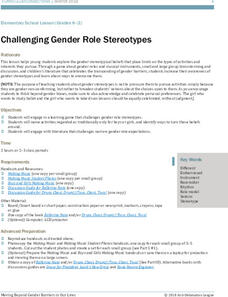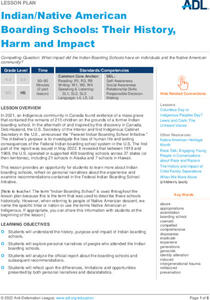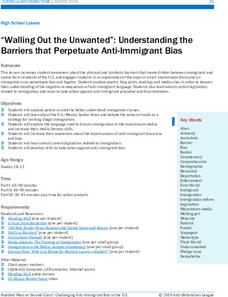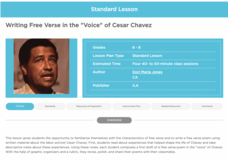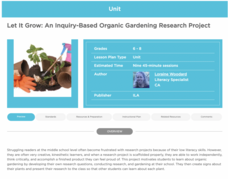Anti-Defamation League
The Revealers: Discussion Guide for Grades 6-8
Suspense! Rebellion! Cyberbullying! No wonder Doug Wilhelm's novel The Revealers appeals to middle schoolers. Instructors new to using the novel and experienced veterans will find this discussion guide invaluable. Discussion questions,...
Anti-Defamation League
The Skin I’m In: Discussion Guide for Grades 8 and Up
Words can hurt! But self-esteem can blunt the impact. That's the takeaway when discussing the themes in Sharon G. Flake's powerful novel The Skin I'm In. A discussion guide leads groups through a study of this narrative of a girl who is...
National Endowment for the Humanities
Arabic Poetry: Guzzle a Ghazal!
Learners research the evolution and cultural significance of the Arabic ghazal form of poetry. They, in groups, compose an original ghazal poem and read it aloud to the class.
Anti-Defamation League
What are Reparations and Should We Enact Them?
Young social scientists investigate recent legislative proposals for reparations for African Americans. They examine the rationale behind the proposals by viewing videos and reading related articles. To close the lesson, scholars craft a...
Anti-Defamation League
Lonnie Chavis of 'This Is Us' Writes about Racism
Scholars read and discuss an essay by 12-year-old actor Lonnie Chaves about racism, paying close attention to how racism presents itself in interpersonal and institutional ways. Learners reflect on how they experience or witness racism...
Anti-Defamation League
Challenging Gender Role Stereotypes
Through thoughtful discussion and a read-aloud, scholars challenge gender role stereotypes. Pupils examine pictures and collaborate with their small groups to debunk stereotypes. They explain what gender role stereotypes they know of and...
Anti-Defamation League
Indian/Native American Boarding Schools: Their History, Harm and Impact
Encultureate, assimilate, or eliminate? The 2021 discovery of a mass grave of over 200 children on the site of a former Canadian Indian Boarding school led to the creation of the Federal Indian Boarding School Initiative. High schoolers...
Anti-Defamation League
Analyzing Primary Source Documents to Understand U.S. Expansionism and 19th Century U.S.-Indian Relations
Historical events can be viewed from multiple perspectives. This simple truth is brought home in a lesson that examines primary source documents related to the Lewis and Clark Expedition, the Doctrine of Discovery and Manifest Destiny,...
Anti-Defamation League
Viewing History from Multiple Perspectives
Celebration or protest song? The full text of Woody Guthrie's "This Land is Your Land" opens a study of the Lewis and Clark Expedition, the Louisiana Purchase, and Western Expansion from various perspectives. Middle schoolers examine...
Anti-Defamation League
Building a Foundation for Safe and Kind Online Communication
Put a spotlight on internet safety with a lesson designed to boost positive online communication. Scholars listen to the story, Yettele's Feathers by Joan Rothenberg, and answer questions. An emoji-themed handout challenges pupils to...
Anti-Defamation League
Nothing Wrong with a Three-Legged Dog: Discussion Guide for Grades 3-5
Scholars study the book, Nothing Wrong with a Three-Legged Dog by Graham McNamee to encourage an antibullying trend in their school and community. Chapters and themes examine bias, coping skills, how to respond to bullying, and being a...
Anti-Defamation League
Say Something: Discussion Guide for Grades 2-4
Empower pupils to stop bullying when they see or experience it with a activity that showcases the book, Say Something by Margaret Paula Moss. After reading the tale and thoughtfully discussing its characters, they share their own...
Anti-Defamation League
The Name Jar: Discussion Guide for Grades Pre-K–1
A lesson spotlights the story, The Name Jar, by Yangsook Choi. After a read-aloud, the class retells the story using puppets or dress-up. They participate in a thoughtful discussion about the story, answer questions relating the book to...
Anti-Defamation League
“Walling Out the Unwanted”: Understanding the Barriers that Perpetuate Anti-Immigrant Bias
As part of a study of immigrant bias, high schoolers investigate the language used in blogs, readings, media reports, and current legislation whose language perpetuates xenophobia. They then consider ways they can get involved in...
Anti-Defamation League
Building Alliances
Bystander or up-stander? The final instructional activity in the "Looking Back Reaching Forward" unit asks participants to consider how they can become involved in encouraging change in their school and community.
Anti-Defamation League
Bringing It Home
The "Bringing It Home" lesson plan asks scholars to investigate segregation and diversity in their school. They research, collect, and analyze local demographics. After reflecting on their personal experiences with cliques and social...
Anti-Defamation League
Sixty Years Later
Has any progress been made in desegregating schools since 1954's Supreme Court case Brown v. Board of Education? To find out, class members examine charts and graphs representing U.S. schools' racial, ethnic, and socioeconomic...
Anti-Defamation League
With All Deliberate Speed
Has the integration of U.S. schools proceeded "with all deliberate speed?" Has progress been made? Those are the questions young historians must consider as they examine the barriers to and opportunities revealed in a study of timelines...
Anti-Defamation League
The Road to Brown
As part of the study of segregation in U.S. schools, scholars research and create a timeline of events that led to the historic Supreme Court case, Brown V. Board of Education. Groups research a topic or event that led to the decision,...
ReadWriteThink
What is Poetry? Contrasting Poetry and Prose
Introduce middle schoolers to the different strategies used when reading prose versus poetry. Groups use a Venn diagram and a poetry analysis handout to compare the characteristics of an informational text and a poem on the same subject...
ReadWriteThink
Writing Free Verse in the "Voice" of Cesar Chavez
Introduce middle schoolers to free verse poetry with a lesson that has young poets read two free verse poems and list the common characteristics of the form. They then read a passage from Cesar Chavez's biography and a free verse poem...
ReadWriteThink
Persuasive Essay: Environmental Issues
Young environmentalists learn how to craft a persuasive essay about an environmental issue they consider important. After studying the components of a persuasive essay and examining a student model, writers brainstorm possible topics and...
ReadWriteThink
Let It Grow: An Inquiry-Based Organic Gardening Research Project
How does your garden grow? An inquiry-based, organic gardening unit asks young scientists to research a vegetable or flower, create an environment for it, and then plant and tend to the seedling. Gardeners develop their own research...
National Endowment for the Humanities
García Márquez’s Nobel Prize Speech: “The Solitude of Latin America”
To conclude a study of One Hundred Years of Solitude, class members analyze Gabriel Garcia Marquez's Nobel Prize in Literature acceptance speech. After a whole-class discussion of the main ideas in the speech, individuals draft a...







